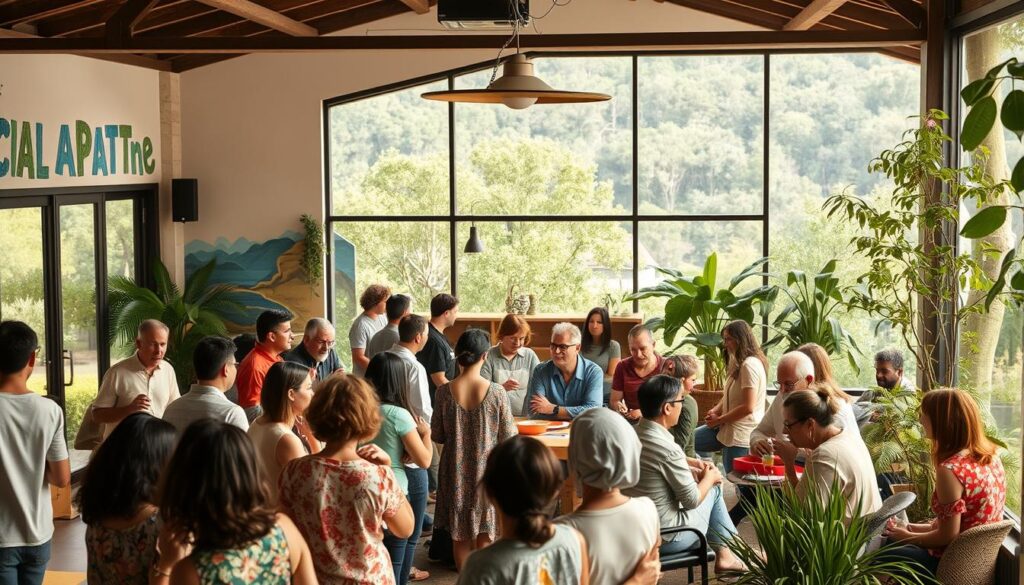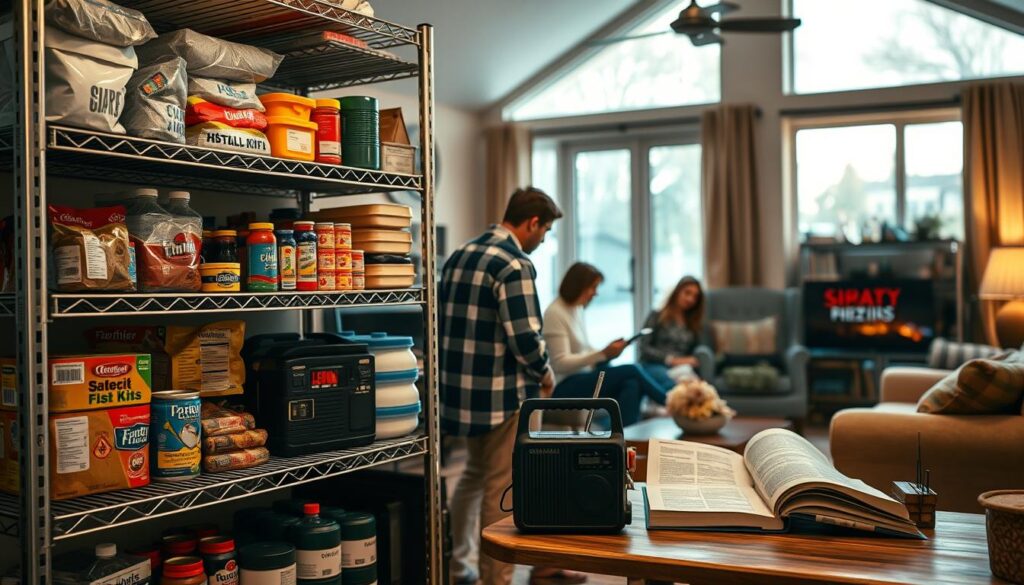In today’s fast world, being flexible is key to success. Looking back, I see that adapting is what makes some people just survive, while others thrive.
Dr. John Demartini’s words really hit home: seeing both sides of a situation can bring certainty and resilience. This mindset has changed my life, letting me face uncertainty with confidence.
Let’s dive into adaptability and how to get better at it. You’ll learn how to deal with life’s surprises and reach your full potential.
Key Takeaways
- Cultivating adaptability is key to thriving in a rapidly changing world.
- Embracing multiple perspectives can lead to greater certainty and resilience.
- Practical strategies can help you develop the adaptability needed to succeed.
- Being flexible allows you to navigate uncertainty with confidence.
- Unlocking your potential requires embracing change and being open to new experiences.
Understanding Adaptability and Its Importance
Adaptability is key in a world where change is constant. It helps me thrive in life’s ups and downs. Being adaptable lets me grab chances and beat hurdles.
What Is Adaptability?
Adaptability means adjusting to new or changing situations. It’s about being versatile and responsive like a chameleon. Emi Olausson Fourounjieva says it’s about upgrading your mindset and boosting emotional smarts.
It’s not just about reacting to change. It’s also about being proactive and ready for what’s next. Being adaptable helps me deal with uncertainty and keep my goals in sight.
Why Adaptability Matters in Daily Life
In everyday life, adaptability is vital for handling unexpected challenges. It lets me adjust to new work schedules or personal changes. Being adaptable makes me resilient and flexible.
It also makes me a better communicator. By being adjustable, I can understand others better and build stronger bonds.
- It helps in navigating through challenges and seizing opportunities.
- It enhances emotional intelligence and resilience.
- It improves communication and relationships.
The Benefits of Being Adaptable
Being adaptable helps us deal with life’s ups and downs better. It makes us more resourceful when things get tough.
Adaptability changes how we face challenges and connect with others. It’s a key trait that can improve many areas of our lives.
Increased Resilience and Flexibility
Adaptability boosts our resilience and flexibility. When we face obstacles, adaptable people can change their strategy. This fluid approach helps them stay on course.

Enhanced Problem-solving Skills
Adaptability also sharpens our problem-solving skills. Being open to new ideas helps us find creative solutions. This accommodating mindset opens up a world of possibilities.
For more on adaptability, check out adaptability as an essential skill for life’s challenges.
Improved Relationships and Communication
Adaptability also improves our relationships and communication. Being flexible in our interactions makes us better communicators. This builds stronger, more meaningful connections in all areas of life.
By embracing adaptability, we can enjoy these benefits. It leads to a more rewarding and successful life.
Recognizing Areas for Improvement
Understanding our personal limits is key to growing stronger in a changing world. By knowing our resilience level, we can spot where we need to get better.
Assessing My Current Adaptability
To check my adaptability, I reflect on how I handle change and challenges. Dr. John Demartini stresses the value of self-evaluation in personal growth. This means looking at how well I adjust to new things, my flexibility when things are uncertain, and my ability to learn from experiences.
A personal adaptability grid can be a helpful tool. It helps sort out life areas where being adaptable is important.
| Area of Life | Current Adaptability Level | Desired Adaptability Level |
|---|---|---|
| Career | 7/10 | 9/10 |
| Personal Relationships | 8/10 | 9/10 |
| Financial Management | 6/10 | 8/10 |
Identifying Personal Challenges
After checking my adaptability, I look for personal hurdles that block my growth. This means spotting patterns or thoughts that make change hard.
Common obstacles include fear of the unknown, trouble letting go, and a fixed mindset. By facing these, I can work on strategies to boost my flexibility and resilience.
Strategies to Cultivate Adaptability
Modern life is full of changes, and some strategies can really help us adapt. Becoming adaptable is an ongoing journey. It means embracing change, growing our minds, and learning to let go.
Embracing Change and Uncertainty
Adapting to change and uncertainty is key. It’s about being open to new things and seeing challenges as chances to grow. Emi Olausson Fourounjieva says having a winning mindset and emotional intelligence are vital. This way, we can be more versatile and ready for anything.
“The greatest glory in living lies not in never falling, but in rising every time we fall.”
Developing a Growth Mindset
A growth mindset is essential for adapting. It means believing we can get better with effort and hard work. This mindset makes us more adjustable and strong when faced with tough times. By focusing on learning, we can handle complex situations better.
| Strategy | Description | Benefit |
|---|---|---|
| Embracing Change | Being open to new experiences | Increased resilience |
| Growth Mindset | Believing in personal development | Enhanced problem-solving skills |
| Letting Go of Control | Accepting uncertainty | Improved relationships and communication |
Learning to Let Go of Control
Letting go of control is important for adaptability. It’s about knowing we can’t control everything. By accepting uncertainty, we become more responsive and less stressed. For more on mental toughness, check out my tips for building unbreakable mental.

The Role of Mindfulness in Adaptability
Mindfulness is key to being adaptable in today’s world. It helps me handle challenges and changes better. I become more resourceful and fluid in my actions.
Mindfulness means being in the moment and observing my thoughts without judgment. It keeps me focused and calm, even when things get tough. This mindset is essential for adapting to new situations.
Practicing Mindfulness Techniques
Several mindfulness techniques help me adapt better. These include:
- Meditation: It makes me more aware of my thoughts and feelings.
- Deep Breathing: It calms my mind and lowers stress.
- Mindful Movement: Activities like yoga or tai chi improve my flexibility.
By making these practices a part of my day, I’m better at dealing with surprises and complex problems.
Staying Present Amidst Change
Mindfulness helps me stay in the moment, even when things change. It keeps me from worrying about the future or dwelling on the past.
| Mindfulness Benefits | Adaptability Outcomes |
|---|---|
| Reduced stress and anxiety | Improved ability to handle uncertainty |
| Increased focus and clarity | Enhanced problem-solving skills |
| Better emotional regulation | More effective communication and relationships |
The table shows how mindfulness boosts adaptability. It helps with stress, focus, and solving problems.
In summary, mindfulness is essential for adaptability. By using mindfulness techniques and staying present, I can face life’s challenges more easily. I become more fluid and accommodating.
Building Strong Support Networks
Building strong support networks is key to being adaptable and resilient. As I work on becoming more adaptable, I’ve learned that a strong community is vital. It makes a big difference.
A good support network acts as a safety net when things change or get uncertain. It lets me be more flexible and open to new things. Through these networks, I get different views, emotional support, and resources that help me grow.
Importance of Community in Adaptability
Community is very important for adaptability. Being part of a community lets me learn from others, share experiences, and get insights. For example, joining community groups or events can show me new ways to handle tough times.
Also, a supportive community boosts my resilience by giving me encouragement and motivation. This support helps me stay on track and adapt better to changes. To learn more about how strong relationships and networks help with resilience and adaptability, check out this resource.

Seeking Feedback and Guidance
Seeking feedback and guidance is also key to building strong support networks. By listening to constructive criticism and advice, I can find areas to improve and tackle challenges. This helps me grow personally and professionally.
Also, asking for feedback shows I’m ready to learn and adapt. This leads to deeper, more meaningful relationships in my support network. Through giving and getting feedback, I can improve my approach to challenges and become more resilient.
Real-life Examples of Adaptability
In a world full of uncertainty, being adaptable is key. It sets apart those who succeed from those who don’t. Looking back, I see how being versatile and responsive helped me overcome many hurdles.
Dr. John Demartini’s story is truly inspiring. He faced many challenges but became a top human behavior expert. His ability to adapt and learn shows the power of being flexible.
Personal Experiences of Overcoming Adversity
I’ve learned the value of adaptability firsthand. Being adjustable helped me get through tough times. It taught me that adaptability is more than just coping with change; it’s about thriving in uncertainty.
When plans changed suddenly, I learned to be responsive and flexible. This skill not only helped me deal with immediate challenges but also built my resilience and confidence.
Inspiring Stories from Others
Emi Olausson Fourounjieva is another great example of adaptability. She faced big challenges but showed incredible resilience and adaptability. Her story shows us that with the right mindset, we can conquer any obstacle.
These stories, along with my own, show how vital adaptability is today. By embracing change and being open to new experiences, we build the skills and resilience needed to thrive in a changing world.
Remember, adaptability is a journey that never ends. It takes ongoing effort and a desire to learn and grow. By adopting this mindset, we can not only face today’s challenges but also set ourselves up for success in the future.
Tools and Resources for Developing Adaptability
In today’s fast world, having the right tools is key for adaptability. We face many challenges and uncertainties. Being resourceful and fluid helps us thrive.
Many resources are out there to help us become more adaptable. These include educational materials and interactive learning experiences. They aim to make us more accommodating.
Recommended Books and Podcasts
Looking to learn more about adaptability? There are great books and podcasts to check out. Some top books are:
- “The Art of Possibility” by Rosamund Stone Zander and Benjamin Zander
- “Mindset: The New Psychology of Success” by Carol S. Dweck
- “Adaptability: The Art of Winning in an Age of Uncertainty” by Max McKeown
For podcasts, try these:
- The Tim Ferriss Show
- The Happiness Lab with Dr. Laurie Santos
- How I Built This
Online Courses and Workshops
Online courses and workshops offer hands-on learning. They’re great for developing adaptability. Here are some top options:
| Platform | Course/Workshop | Description |
|---|---|---|
| Coursera | Learning How to Learn | This course teaches strategies for effective learning and adapting to new information. |
| Udemy | Adaptability and Resilience | This workshop focuses on building resilience and adapting to change in personal and professional contexts. |
| edX | Managing Change | This course explores strategies for managing and adapting to change in organizational settings. |
Using these resources can help you become more adaptable and resourceful in uncertain times.
Measuring My Progress in Adaptability
Setting goals and reflecting on my journey helps me measure my progress in adaptability. This keeps me focused on my objectives and allows for adjustments to grow personally.
Setting Personal Goals and Milestones
Dr. John Demartini stresses the value of setting goals to track progress and stay motivated. To grow in adaptability, I must set clear, achievable goals that match my values and dreams.
Effective goal-setting strategies include:
- Breaking down big goals into smaller tasks
- Creating a timeline for milestones
- Identifying obstacles and planning for them
Setting specific goals and milestones helps me track my progress and adjust as needed.
Reflecting on My Journey
Reflecting on my journey is key to measuring adaptability progress. Regularly assessing my experiences helps me see my strengths and weaknesses. It also gives me insights into my growth.
Effective reflection methods include:
- Keeping a journal of my thoughts and feelings
- Getting feedback from trusted friends, family, or mentors
- Practicing self-reflection through meditation or mindfulness
Reflecting on my journey helps me refine my adaptability development. It guides my decisions for future growth.
As I continue to work on adaptability, I will keep setting goals and reflecting on my journey. This ongoing effort will help me stay flexible, resilient, and focused on my personal goals.
The Future of Adaptability
Looking back, I see that adaptability is more than a skill. It’s a journey that keeps shaping my life. Being open to change helps me face life’s ups and downs with confidence.
Shaping Life through Adaptability
Adaptability makes me stronger when things get uncertain. It helps me adapt quickly to new situations. This way, I can grab new chances and grow in many areas of my life.
Lifelong Learning and Growth
Experts like Emi Olausson and Fourounjieva stress the importance of lifelong learning. By always learning and growing, I stay adaptable. This approach is key to keeping up with the world and achieving success.
FAQ
What is adaptability, and why is it important?
Adaptability means being able to adjust to new situations. It’s key for success because it helps us face challenges and grab opportunities. Being adaptable lets me stay ready for changes and flexible when things get uncertain.
How can I assess my current adaptability?
To check my adaptability, I should think about myself and see where I struggle with change. Knowing my strengths and weaknesses helps me find ways to get better. This makes me more resilient and resourceful.
What are some strategies for cultivating adaptability?
To grow adaptable, I can start by welcoming change and having a growth mindset. Learning to let go of control also helps. These steps make me more flexible and ready for anything.
How can mindfulness help improve my adaptability?
Mindfulness keeps me focused, even when things change or get uncertain. It helps me notice my thoughts and feelings better. This way, I can handle tough situations more effectively.
What role do support networks play in cultivating adaptability?
Having a strong support network is vital for adaptability. Being around people who support me gives me feedback, guidance, and encouragement. This helps me stay adaptable and strong.
How can I measure my progress in adaptability?
To track my adaptability, I should set goals and reflect on my journey often. Seeing my progress helps me know what to work on and celebrate my wins. This keeps me motivated and growing.
What resources are available to help me develop adaptability?
There are many tools to improve adaptability, like books, podcasts, and online courses. Using these resources gives me new ideas, skills, and strategies. This helps me reach my goals and grow.
How can adaptability shape my life and future?
Embracing adaptability unlocks my full ability and leads to success and resilience. By always learning and growing, I can keep thriving in a changing world. This makes me flexible, responsive, and ready for new challenges and chances.



